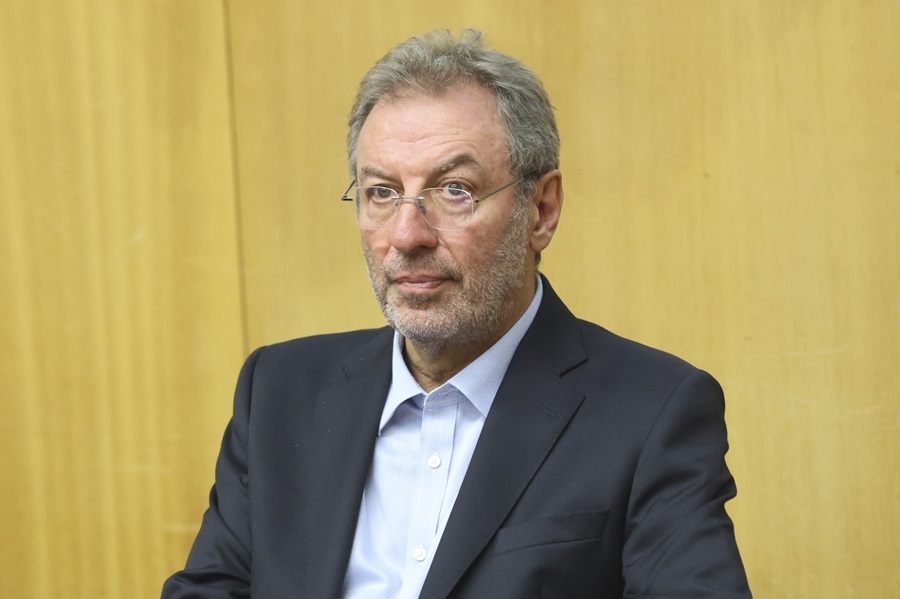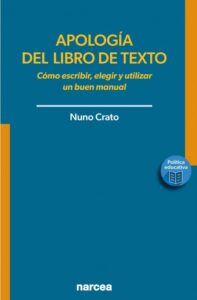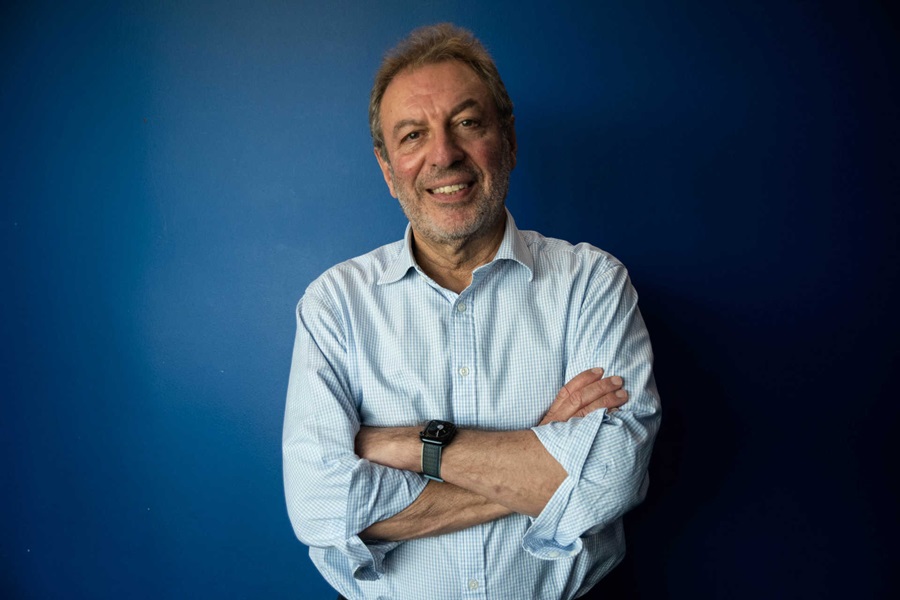- GovernancePolitics
- 16 de October de 2024
- No Comment
- 13 minutes read
Nuno Crato: “Textbooks are essential for good training”

Interview with Nuno Crato, Former Portuguese Minister of Education (2011-2015), professor, writer, mathematician, researcher and renowned international educational expert
Nuno Crato: “Textbooks are essential for good training”



Nuno Crato, the Minister of Education who led Portugal to the best educational results in its history, has just published Apología del libro de texto (Narcea), a book that delves into the need to structure and simplify educational content to achieve better comprehensive learning. President of “Iniciativa Educaçao“, mathematics and statistics professor and researcher at Cemapre/ISEG of the University of Lisbon, he is also a tireless communicator, as well as a man endowed with great affability and communication skills.
What is the ideal textbook like? What should it contain?
It is difficult to say in a few words. I assure you, without exaggeration, that I devoted almost all 150 pages of my book to developing this idea. Formally, it must be well-written, comprehensible, error-free, and contain exercises, questions and activities to help learning.
Pedagogically, at the risk of omitting many other essential characteristics, I would emphasize that it should translate the curriculum in a way that organizes students’ learning and this translation must be as well-structured, progressive and ambitious as possible.
“I would emphasize that it should translate the curriculum in a way that organizes students’ learning and this translation must be as well-structured, progressive and ambitious as possible”
Do you think it is still a “translation of the curriculum” today?
It should be. In theory, I assume that there is an organised curriculum and that the textbook translates it. However, too often, unfortunately, the curriculum is so poor or vague that good textbooks become “the curriculum”…
This is, of course, better than having no structure at all, but it reverses the natural order of things.
Are there quality textbooks currently available in Portugal?
Yes, although the quality varies. In 2006, a legal process for evaluating and certifying textbooks was introduced, which resulted in a substantial improvement in their quality. Later, when the educational orientation changed in 2016, this process was neglected in practice, and as a result, the quality of textbooks now varies considerably.
Do you consider a public policy for evaluating and certifying all textbooks is necessary?
Yes. An evaluation and certification policy can greatly improve the quality of textbooks. And let us not forget that textbooks are essential for the good education of students, both directly and through teachers and parents.
“An evaluation and certification policy can greatly improve the quality of textbooks”
Studies show that textbooks are extremely effective for teachers with less preparation or less experience, yet they remain useful even for the best teachers. They are also great allies for parents, as with a textbook they can better help their children.
Would it be a levelling element for disadvantaged families?
Yes, no doubt, because it allows knowledge to be transferred to students in an organised way and makes it easier for families with fewer resources to follow what their children are studying and, therefore, help them. This is important for all families, but even more so for those who do not have a good library and have fewer cultural and economic resources.
How and when did the decline of textbooks begin?
It could be said that the criticism of textbooks is old, possibly as old as the textbooks themselves. But there is a more modern reaction that should worry us. It has its roots in relativistic and anti-scientific ideas that diminish the importance of knowledge. Postmodern philosophy, in particular, downplays humanity’s great achievements, such as mathematics and science, and downplays the importance of great creations, such as music and literature. This disdain translates, in the case of textbooks, in a lack of interest in, or even attacks on, the organised and well-structured transmission of knowledge. If the accumulated knowledge of humanity does not matter, then transmitting it via textbooks is considered unnecessary.
“Postmodern philosophy, in particular, downplays humanity’s great achievements, such as mathematics and science, and downplays the importance of great creations, such as music and literature”
During the 1960s and 1970s, hostility towards textbooks began to develop in both the United States and France. It was argued that knowledge was less important than creativity, as if one could be creative without having basic knowledge.
Let me digress: in this century we have data and studies on student performance in many countries of the world, data that allows us to know the evolution of these countries and compare student results across states and regions. I am referring to studies such as PISA and TIMSS. These reports have revealed that there are countries with more structured education systems, focused on demanding and well-organized curricula, such as Singapore or Japan. Many people dislike these findings, arguing that despite these data may be real, such results only reflect memorised and mechanical knowledge, without developing creativity.
This accusation was difficult to challenge, as these international studies did not analyse the creativity or originality of young people’s thinking. However, the latest PISA survey in 2022 included a creativity test: inventing a dialogue, designing an advertising poster, and so on. Curiously, the top-performing countries were again Singapore, Japan… A strong correlation is revealed between cognitive performance based on knowledge, and creativity…
How is creativity fostered?
There are several studies in cognitive sciences and neuropsychology, which show that creativity depends on many neural connections in the brain, which means a lot of knowledge and practice.

What are the “advanced organisers” you mention in your book?
This is a concept that is very useful in teaching, both in the classroom and in textbooks. But it can be useful for all forms of communication. It is about providing a framework that encompasses what will be explained next, guiding the reader or listener. In the famous “Rosenshine Principles,” a well-known list of recommendations for the classroom, it is suggested, for example, to review previous lessons to frame new learning and announce what is to come. This is a way of using advanced organisers.
“Ausubel argued that concepts should be transmitted in an organised and progressive manner, with meaning given by the relationships between concepts”
Do you believe current teacher training provides educators with good contextual mastery?
No, unfortunately not, in general. In most of the countries I know, initial teacher training has gaps. On the one hand, it does not devote enough effort to mastering the subjects taught – and that is terrible, because you cannot teach well without a broad subject knowledge. On the other hand, classes in pedagogy, psychology and similar subjects are often outdated, failing to incorporate modern knowledge and concentrate instead on ideology or obsolete theories. For example, instead of explaining the importance of organized knowledge, they focus on student motivation and self-discovery; instead of explaining the importance of frequent assessment, both formative and summative, there is an insistence that each student is a special being who should not be pressured…
In your book you detail certain confusions in competency-based pedagogy, one of them about David Ausubel’s theory of meaningful learning. Could you explain who he was?
Ausubel was a cognitive psychologist who made important contributions to modern scientific learning theory. But it has been much misunderstood, in the sense that much of what it is said he said is exactly the opposite of what he really said.
For example, he developed the concept of meaningful learning, as opposed to rote memorization. Many educational ideologues interpret this theory as a recommendation to teach only what is personally meaningful for students. This is not the case! Ausubel argued that concepts should be transmitted in an organised and progressive manner, with meaning given by the relationships between concepts. It is cognitive meaning, not personal meaning!
What led, after the 1930s debate that Ausubel talks about in his 1963 book, to a more or less structured and demanding teaching in several countries without applying the pedagogical fashions of that time? What was the main reason for the rejection of project-based and discovery learning? Could this rejection be reversed today?
We are currently regressing. In Ausubel’s time, it was already clear that while projects were valuable, project-based learning should not replace structured instruction. Challenges are useful, but not when diluted in discovery-based teaching. There are always attempts to avoid facing real problems and instead call for a revolution in teaching, which I think is a way of avoiding reality.
“There are always attempts to avoid facing real problems and instead call for a revolution in teaching, which I think is a way of avoiding reality”
What are the “demoralizing and defeatist questions” (p. 44). Do you think we live in a world that is overly utilitarian?
It is difficult to generalise. However, I do believe that some students’ frequent questions about the usefulness of what they are learning are defeatist. For now, the point is about learning. The utility will become evident later. With this I am not saying that students should not be shown the usefulness of what they are learning, but if we subordinate everything to immediate usefulness, we will not progress.
In educational terms, what is useful or what is not?
In educational terms, everything that expands the knowledge and training of students is useful. But what is most useful is what allows them to learn more and have more experiences. This is what Michael Young calls “powerful knowledge” – structured knowledge that transcends students’ limited universe. In Spain, Moreno Castillo, Xavier Massó, and others have explained this very well.
The worst thing is that many educators or educational theorists embrace a defeatist and demoralizing vision that student motivation is the starting point of everything. If this were the case, schools would become amusement parks, to borrow a Gregorio Luri’s sharp criticism, and would do little to expand students’ universe.
Will a subject-based education rather than a competency-based one be possible in Europe one day?
I hope so. That was the case in Portugal until 2015, that is why we made so much progress. This is the case in Estonia, which is far ahead of most other countries, and it has been the case in Poland. France has also been trying to do it in for a few years now. So, let us not be discouraged!
“Is most useful is what allows them to learn more and have more experiences”
What are your current projects?
Many. Happily. After writing this book, I am just finishing another one that will be published in Portuguese in January 2025, on the subject of learning in general. Its title is – not very original, I confess! – Aprender. Meanwhile, two other books on which I have collaborated will be published. Springer will publish a book in English on PISA results after Covid-19, which I co-edited with Harry Patrinos, an economist from the World Bank, now at the University of Arkansas. This is an “open-access” book that will be available for download in a few weeks. And a second book on the curriculum, in which I collaborated, will also be released.
I’ve recently appointed to the Scientific Council for National Education of the French State, which was a great honour for me. It is more work, but a very interesting one.
I continue to work at the Iniciativa Educação foundation in Portugal and I travel a lot. Fortunately, I am often invited to contribute to educational debates in various countries, including Poland, Saudi Arabia, Argentina, Uruguay, Brazil.
And I have had the honour of being heard by my friends in Barcelona!
___
→ Book review Apología del libro de texto
________________________________________
Source: educational EVIDENCE
Rights: Creative Commons

